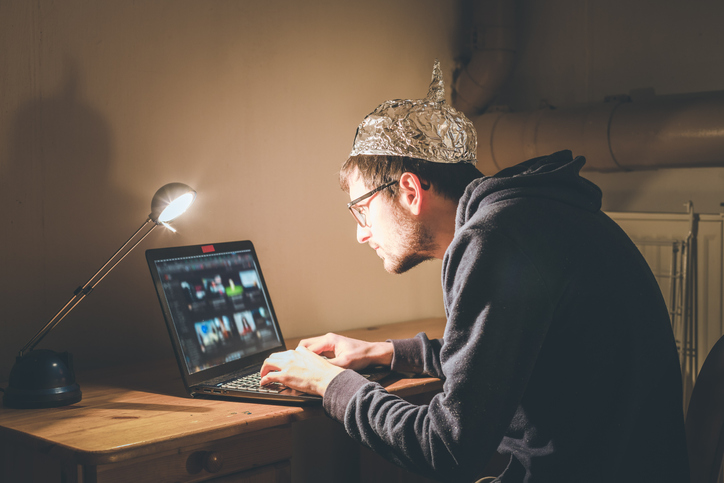If you have not heard of any conspiracy theories, you must be living with no television and no internet service–and that might make you a pretty fortunate person! Conspiracy theories are everywhere and on just about any topic imaginable. But what are they really and why are they so rampant?
What is a conspiracy theory?
Merriam Webster defines a conspiracy theory as: “a theory that explains an event or set of circumstances as the result of a secret plot by usually powerful conspirators.”
Thus in part, a conspiracy theory is a fancy term for a well-thought out lie.
Dictionary.com defines a conspiracy theory as “1) a theory that rejects the standard explanation for an event and instead credits a covert group or organization with carrying out a secret plot… 2) a belief that a particular unexplained event was caused by a covert group… 3) the idea that many important political events or economic and social trends are the products of deceptive plots that are largely unknown to the general public…”
Why do people believe conspiracy theories?
We all have a huge need to belong. When a person feels they have an explanation for events which not many other people are aware of, it can give them a sense of belonging and uniqueness. Thus, these conspiracies may appeal to lonely people.
We want to know the “why”. When the world is as scary and unpredictable as it has been the last year, we need security. These stories, no matter whether they are lies or not, can give people a sense of psychological security because they are an explanation even if they are wrong.
The mental health component. Then there are some persons who have mental health disorders which make them more susceptible to latching onto conspiracies theories. Certain personality disorders can cause people to be more suspicious and that suspicion can lead to looking for sinister theories for unsettling events. Also persons with high grandiosity and low self-esteem seem to be more vulnerable to these lies.
…then came 2020.
The year 2020, led to more loneliness than most of us have ever experienced. There were terrible events in the news every day. Uncertainty was a constant companion as our lives were ever-changing with the guidelines for safety. Fear at the threat of becoming sick or dying was constant. People who already had tendencies toward various mental health concerns along with people who did not, suddenly were stressed to the point of breaking. Mental health began deteriorating across all age groups and socioeconomic categories. Additionally, we now know that 1/4 to 1/2 of persons who are infected with SARS-CoV-2, have mental health or brain health concerns in the following 4-6 months. All these factors were a perfect storm to increase conspiracy theories.
How long have conspiracy theories been around? Is the church vulnerable to them? Why do we need to understand this? How can I be safe? Is there a Christian perspective on conspiracy theories?
In this series, I will do my best to address these questions and give you straight answers.
(See the following for further reading.)
Conspiracy Theory. (n.d.). Retrieved January 16, 2021, from https://www.merriam-webster.com/dictionary/conspiracy%20theory
Dictionary.com. (n.d.). Conspiracy theory. Dictionary.com. https://www.dictionary.com/browse/conspiracy-theory.









